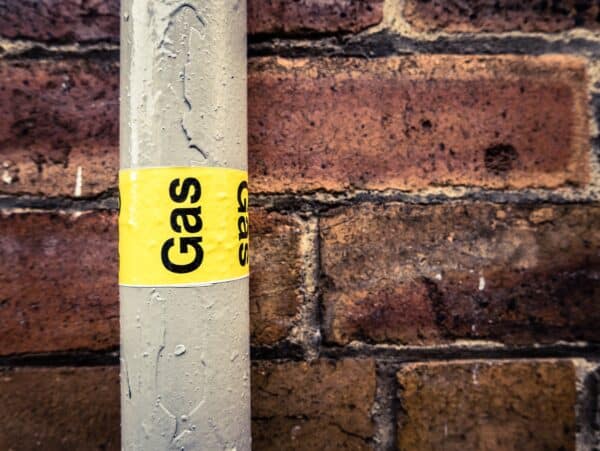
Natural gas is a powerful fuel that makes it affordable and efficient to run your appliances. However, this helpful energy source does come with some downsides. Since it is a gas, natural gas is hard to contain. Any time there is a small gap in your system, the gas can float right out. This leads to all sorts of issues, so it’s important to be able to identify a gas leak. Keep reading to discover the warning signs of a gas leak and learn how to solve the issue.
Common Signs of a Natural Gas Leak
The first sign to look out for is a smell. Gas is naturally odorless, but all gas companies add a stinky chemical to their gas to help people detect leaks. This odorant makes your gas smell like sulfur. Some people describe the scent as smelling like sewage, rotten eggs, or cabbage. Any time you notice this smell, a natural gas leak may be the issue. Natural gas leaks are particularly likely to cause smells in small, enclosed areas where gas can build up. If the leak is outside, the smell may seem to come and go as the breeze blows it away.
The other big sign to look out for is a strange noise. Gas is usually under pressure inside of your system, so when there is a leak, it will rush out rapidly. This displaces your air and causes a noticeable noise. The volume will change depending on how large the leak is. Smaller leaks can cause a tiny, high-pitched hissing noise. Larger ones often cause a low-pitched rushing or roaring noise. Keep in mind that sounds can travel strangely within your home systems, so a leak near your furnace can cause whistling sounds from a vent.
You should also regularly inspect all visible parts of your gas system. Look at your appliances and pay close attention to the gas line and its connectors. Any physical damage, such as warping, cracking, crumbling, or gaping, can indicate a gas leak. Even if you don’t notice any other signs, damage to your gas system can indicate there is at least a small leak.
More Subtle Gas Leak Warning Signs You Need to Know About
Not all gas leaks are drastic leaks with rushing air and strange smells floating around all the time. In some cases, a gas leak can be very subtle. If you just have a tiny bit of gas escaping or if your leak is happening from the main gas line, it can take a little more time to identify it. These easily overlooked signs are still worth being concerned about.
First of all, check your utility bill. If your gas bill is going up without any changes from you, something is using more gas. Try to look at your gas bill history for the past year to see how much your gas cost around the same time of year. A higher bill without any known reason can often mean your gas is escaping.
You should also take the time to check outside your home. Natural gas keeps plants from being able to absorb oxygen properly, so they will start to suffer. Plants may look brown or yellowish, and their leaves can be limp. Long-term exposure can lead to shorter than usual heights and abnormally small leaves. Pay close attention to the plants that run along your gas line or grow near your vents or windows. Plants dying in these areas may indicate a problem.
If your gas leak is happening within the line that runs underneath your land, another sign to look out for is bubbles. As the gas escapes from the line, it will gradually travel upwards through your soil. Wherever there is standing water, this will cause puddles. Try walking around outside after rain to see if there are any areas with constant bubbling. Even when the soil is dry, small puffs of dust may appear as underground bubbles rise to the surface.
Physical Symptoms of a Gas Leak in Your Home
In addition to looking for warning signs of gas leaks, you should also pay attention to your physical health. Frequent exposure to even small amounts of gas can cause health problems. Therefore, if you are having certain unexplained health issues, your gas system might be the culprit.
For many people, the earliest signs of natural gas exposure include a headache and dizziness. People say that they feel lightheaded or woozy. Nausea, fatigue, drowsiness, nosebleeds, ringing ears, and reduced appetite are also common. If you come into direct contact with the gas, you may also experience itching or burning of the eyes and throat. Natural gas exposure tends to cause general feelings of unwellness that are very similar to having the flu.
When levels of natural gas are very high in your home, you may find it hard to breathe. Some people say it feels uncomfortable to take a deep breath while others find themselves breathing more rapidly. If a person stays in an area with natural gas for too long, they may lose consciousness. Natural gas exposure can be deadly.
What to Do If You Suspect a Gas Leak
When there is a potential gas leak in your home, it is important to act fast. If the smell of gas is barely present and you do not feel any physical symptoms, you can open the windows and turn off any fires and electronics in your home before exiting. This can help dissipate built-up gas and prevent fires.
However, if the smell is very strong or if you feel any physical symptoms, you should not wait to leave. Walk away from your home and yard and then seek professional help. When in doubt, always leave immediately instead of taking the time to open windows or turn off appliances. Gas leaks are very dangerous, and you shouldn’t risk your health just to protect your belongings.
The recommended advice for all gas leaks is to call for professional assistance. However, it is important to not use your phone or any electronics near the leak. These can cause static electricity that can ignite your gas. Instead, walk a safe distance away before calling for help. If you have the number for your natural gas utility company, give them a call. They can send someone out to test for a leak and turn off your gas until the leak is repaired. If you cannot reach your utility company, call 911 for assistance.
If you suspect that you have a gas leak, it is also important to get all your gas appliances checked. At Apex Plumbing, Heating, and Air Pros, our team has plenty of experience working with gas water heaters, furnaces, and other devices. We can examine your home, identify gas leaks, and fix the problem. Our technicians also provide a variety of other HVAC and plumbing services, including drain cleaning, furnace and air conditioner repairs, and water heater installations. Give Apex Plumbing, Heating, and Air Pros a call today to learn more about our services in Columbus, OH.





